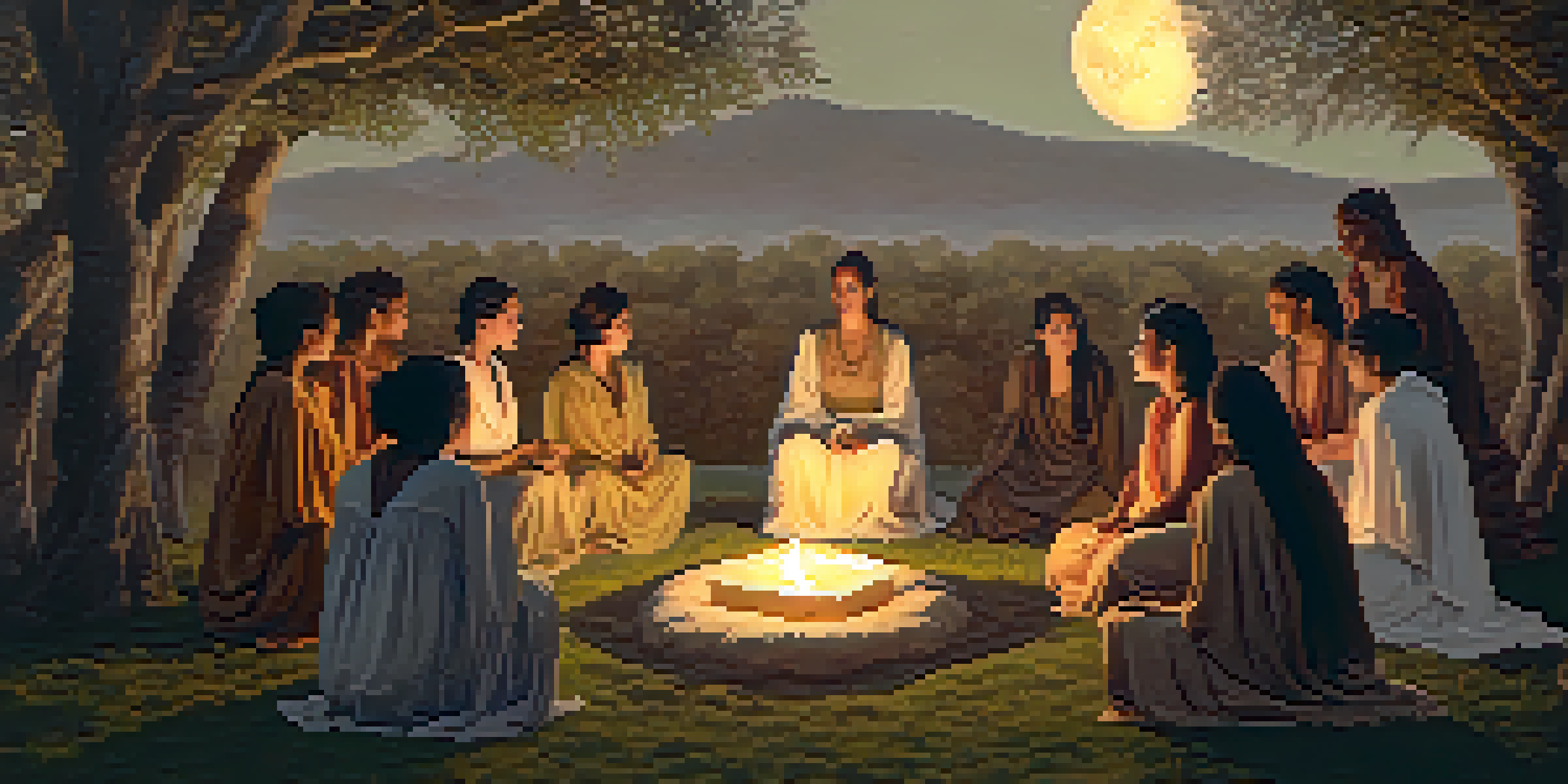Feminist Philosophy and Spirituality: A New Perspective

Understanding Feminist Philosophy and Its Origins
Feminist philosophy emerged as a response to traditional philosophical frameworks that often sidelined women's experiences. It questions the prevalent narratives and seeks to highlight the voices that have been marginalized throughout history. By analyzing concepts of power, justice, and ethics, feminist philosophy aims to create a more inclusive understanding of human rights and dignity.
Feminism is a way of life, a way of being, and a way of thinking that allows women to reclaim their power.
Roots of feminist philosophy can be traced back to thinkers like Simone de Beauvoir and Judith Butler, who challenged existing norms and proposed new ways of thinking about identity and gender. These philosophers not only critiqued society but also envisioned alternatives that empower women and promote equality. Their work laid the groundwork for a rich dialogue that continues to evolve today.
Incorporating diverse perspectives is essential for feminist philosophy to flourish. Intersectionality, a term coined by Kimberlé Crenshaw, emphasizes how overlapping identities—such as race, class, and sexuality—impact women's experiences. This approach enriches feminist discourse, providing a more comprehensive understanding of the challenges women face.
The Role of Spirituality in Feminist Thought
Spirituality often serves as a personal sanctuary for many women, offering a space for self-exploration and growth. In feminist philosophy, spirituality is not just about religious practices but also about connecting with one's inner self and the larger universe. This connection can empower women to reclaim their identities and challenge societal norms.

Feminist spirituality emphasizes the importance of intuition, emotion, and embodied experience, which have traditionally been dismissed in patriarchal frameworks. It encourages women to trust their feelings and experiences as valid sources of knowledge. By doing so, it fosters a sense of agency that can lead to transformative change both personally and socially.
Feminist Philosophy Challenges Norms
Feminist philosophy seeks to elevate marginalized voices and promote a more inclusive understanding of human rights by critiquing traditional frameworks.
Additionally, many feminist thinkers advocate for a spirituality that is inclusive and diverse. This approach embraces various cultural and spiritual traditions, reflecting the multifaceted nature of women's experiences. By celebrating this diversity, feminist spirituality can unite women across different backgrounds in a shared journey toward empowerment.
Challenging Traditional Spiritual Narratives
Traditional spiritual narratives often portray women in subordinate roles, reinforcing stereotypes that hinder progress. Feminist philosophy critiques these narratives, revealing how they perpetuate gender inequality and limit women's potential. By reexamining these stories, feminist thinkers aim to rewrite them in a way that uplifts and empowers women.
The personal is political.
For instance, many religious texts have been interpreted in ways that marginalize female figures. Feminist theologians work to reinterpret these texts, highlighting the strength and agency of women within these narratives. This process not only helps women reclaim their spiritual heritage but also fosters a more inclusive understanding of spirituality.
Moreover, by challenging these traditional narratives, feminist philosophy encourages a broader dialogue about the role of women in spirituality. It opens the door for new interpretations that align with contemporary values of equality and justice while still honoring spiritual traditions. This reimagining can inspire future generations to engage with spirituality on their own terms.
The Intersection of Feminism and Eco-Spirituality
Eco-spirituality, which connects environmental concerns with spiritual practices, has gained traction within feminist circles. This perspective recognizes the interconnectedness of all life and emphasizes the importance of nurturing our planet. Feminist eco-spirituality advocates for a holistic approach that honors both women's rights and environmental sustainability.
By promoting an ecological consciousness, feminist philosophy encourages women to take active roles in environmental activism. This involvement can foster a deeper connection to nature, empowering women to challenge societal norms that prioritize exploitation over stewardship. In doing so, they can advocate for both social justice and ecological balance.
Spirituality Empowers Women
Feminist spirituality emphasizes personal growth and intuition, enabling women to reclaim their identities and challenge societal norms.
Feminist eco-spirituality also highlights the wisdom of indigenous practices that honor the Earth and its resources. By integrating these teachings, feminist thinkers can create a more inclusive framework that respects diverse ways of knowing and being. This collaboration enriches both feminist thought and environmental movements.
Rituals and Practices in Feminist Spirituality
Rituals play a significant role in feminist spirituality, serving as tools for empowerment and community building. These practices can range from small personal rituals to larger ceremonies that celebrate women's achievements and milestones. By creating spaces for women to gather, share, and support each other, feminist spirituality fosters a sense of belonging.
Many feminist rituals incorporate symbols and imagery that reflect women's experiences, such as the moon, earth, and water. These symbols often serve as reminders of strength, resilience, and connection to nature. By honoring these elements, women can cultivate a deeper understanding of their spirituality and its relevance to their lives.
Furthermore, feminist spirituality encourages women to design their own rituals, tailored to their unique experiences and beliefs. This customization allows for a more personal connection to spirituality, empowering women to celebrate their identities in meaningful ways. As a result, these practices can serve as catalysts for personal transformation and collective action.
Feminist Philosophy’s Impact on Social Justice Movements
Feminist philosophy has had a profound influence on various social justice movements, advocating for equality and human rights. By addressing issues such as gender-based violence, reproductive rights, and workplace equality, feminist thinkers have pushed for systemic change. This commitment to social justice aligns closely with the goals of other movements, creating a powerful coalition for change.
The principles of feminist philosophy often intersect with the tenets of other movements, such as LGBTQ+ rights and racial justice. This intersectionality fosters solidarity among diverse groups, emphasizing the shared struggles against oppression. By working together, these movements can amplify their voices and create more significant impact.
Intersectionality Drives Change
By incorporating diverse perspectives and addressing overlapping identities, feminist philosophy strengthens social justice movements and fosters solidarity among various groups.
Moreover, the incorporation of feminist thought into activism encourages a holistic approach to social justice. It challenges activists to consider not only the issues at hand but also the underlying societal structures that perpetuate inequality. This comprehensive perspective can lead to more effective strategies for change and a deeper understanding of the interconnectedness of various forms of oppression.
Looking Forward: The Future of Feminist Spirituality
As we look to the future, feminist spirituality continues to evolve and adapt to the changing landscape of society. New generations of thinkers and practitioners are exploring innovative ways to integrate feminist philosophy with spiritual practices. This fresh perspective invites ongoing dialogue and collaboration among diverse communities.
The digital age has also played a significant role in shaping feminist spirituality, providing platforms for women to share their experiences and insights. Online communities can foster connections that transcend geographical boundaries, creating a global network of support and empowerment. This accessibility allows for a richer exchange of ideas and practices.

Ultimately, the future of feminist spirituality holds the promise of greater inclusivity and understanding. By embracing diverse voices and experiences, it can continue to challenge traditional norms and inspire transformative change. As we navigate this journey together, feminist spirituality will undoubtedly remain a vital force for empowerment and social justice.